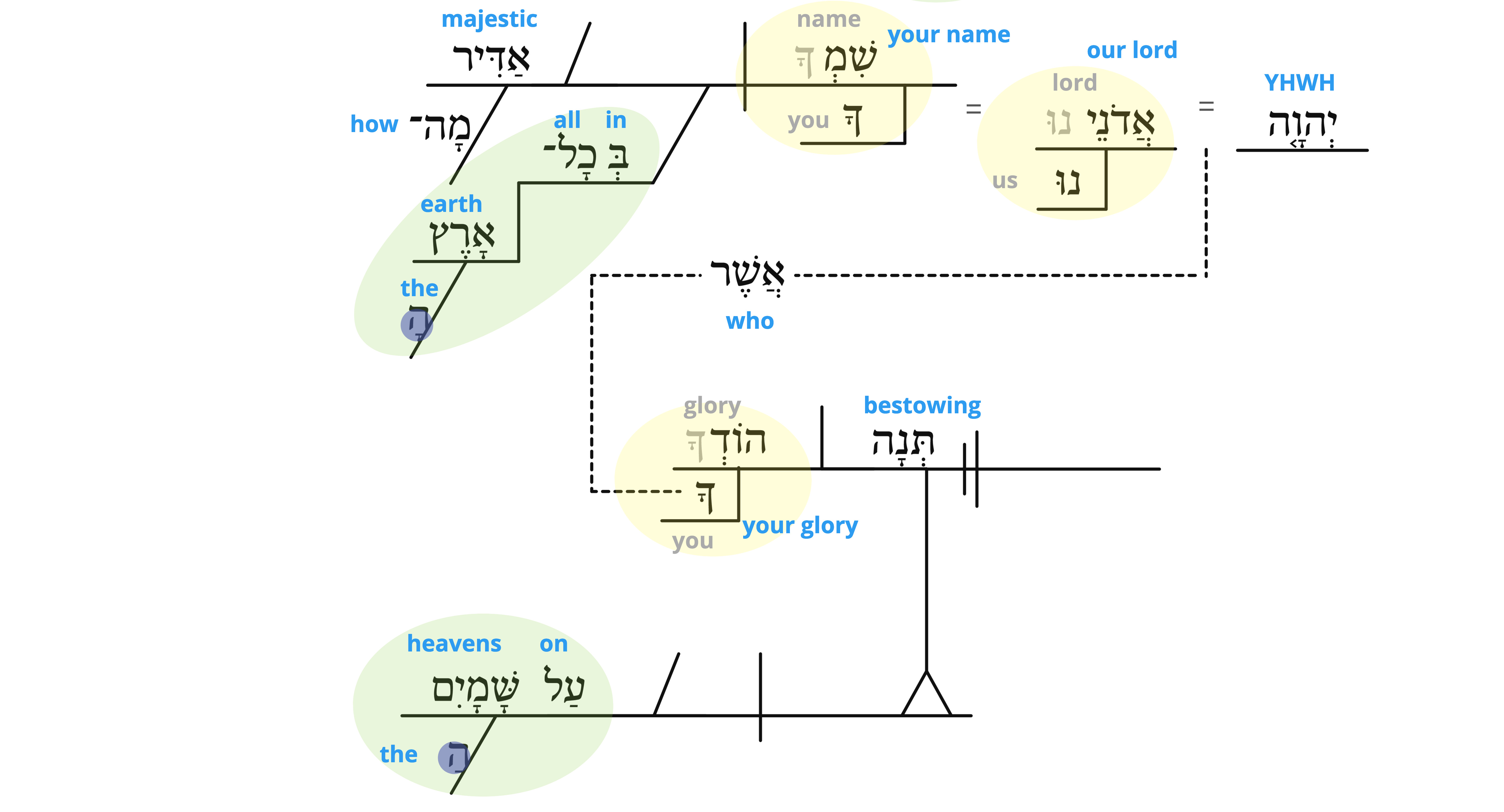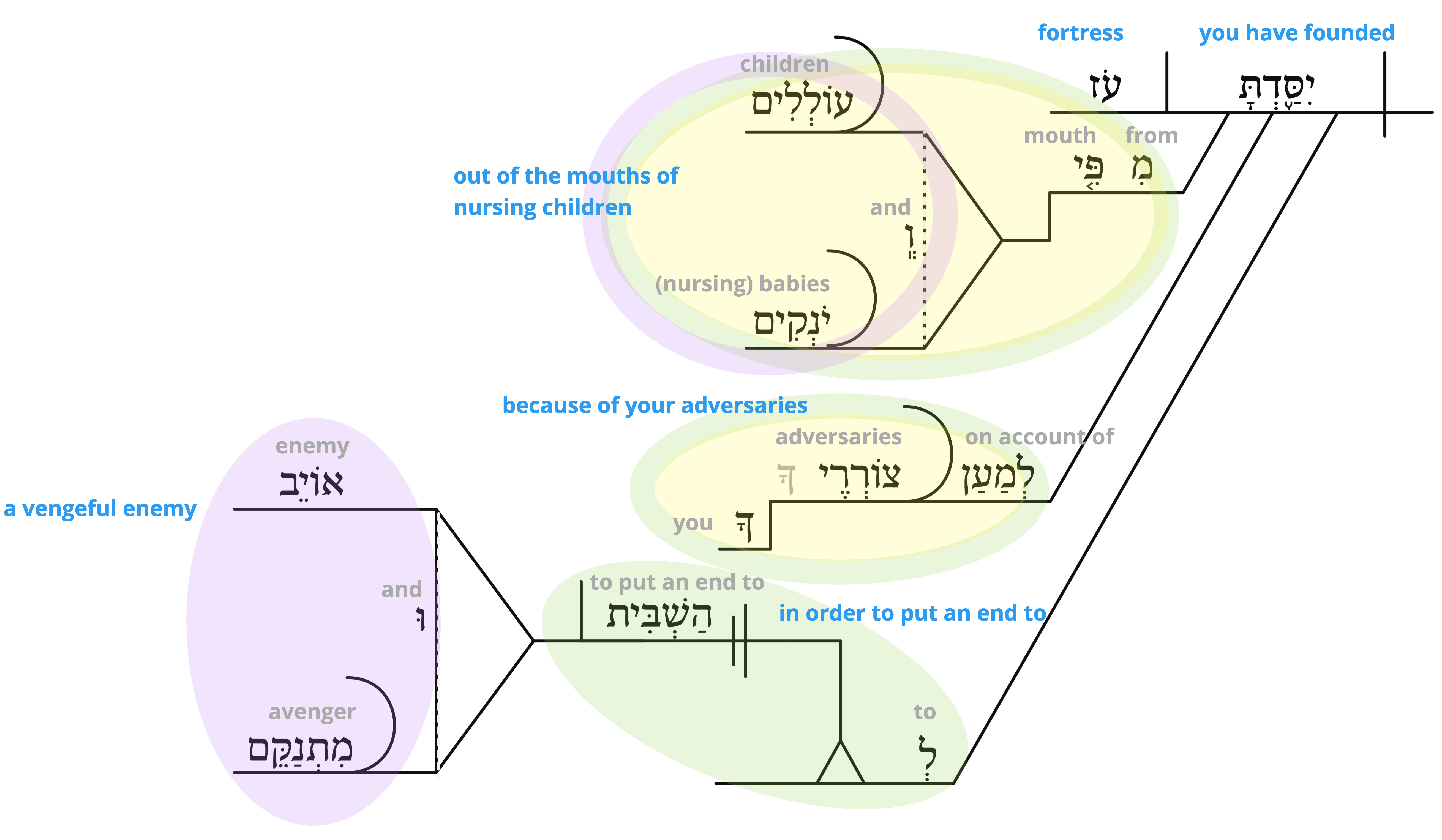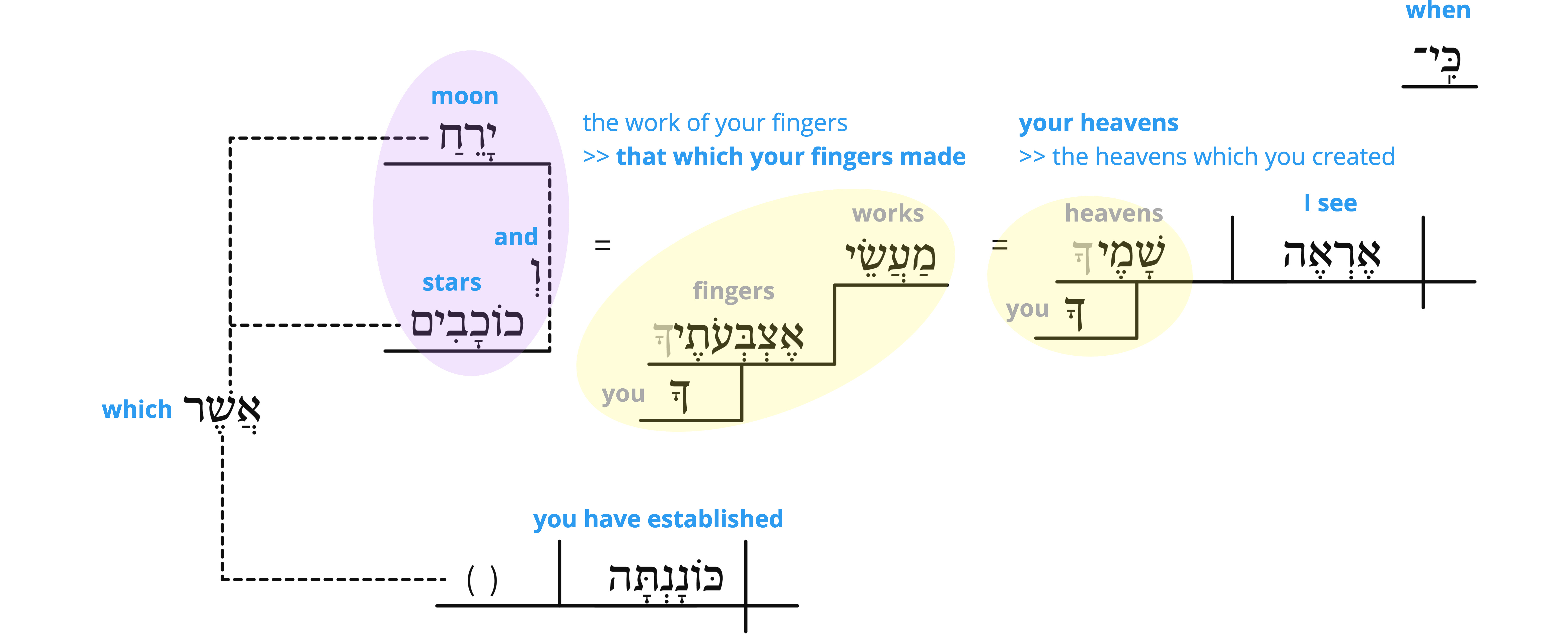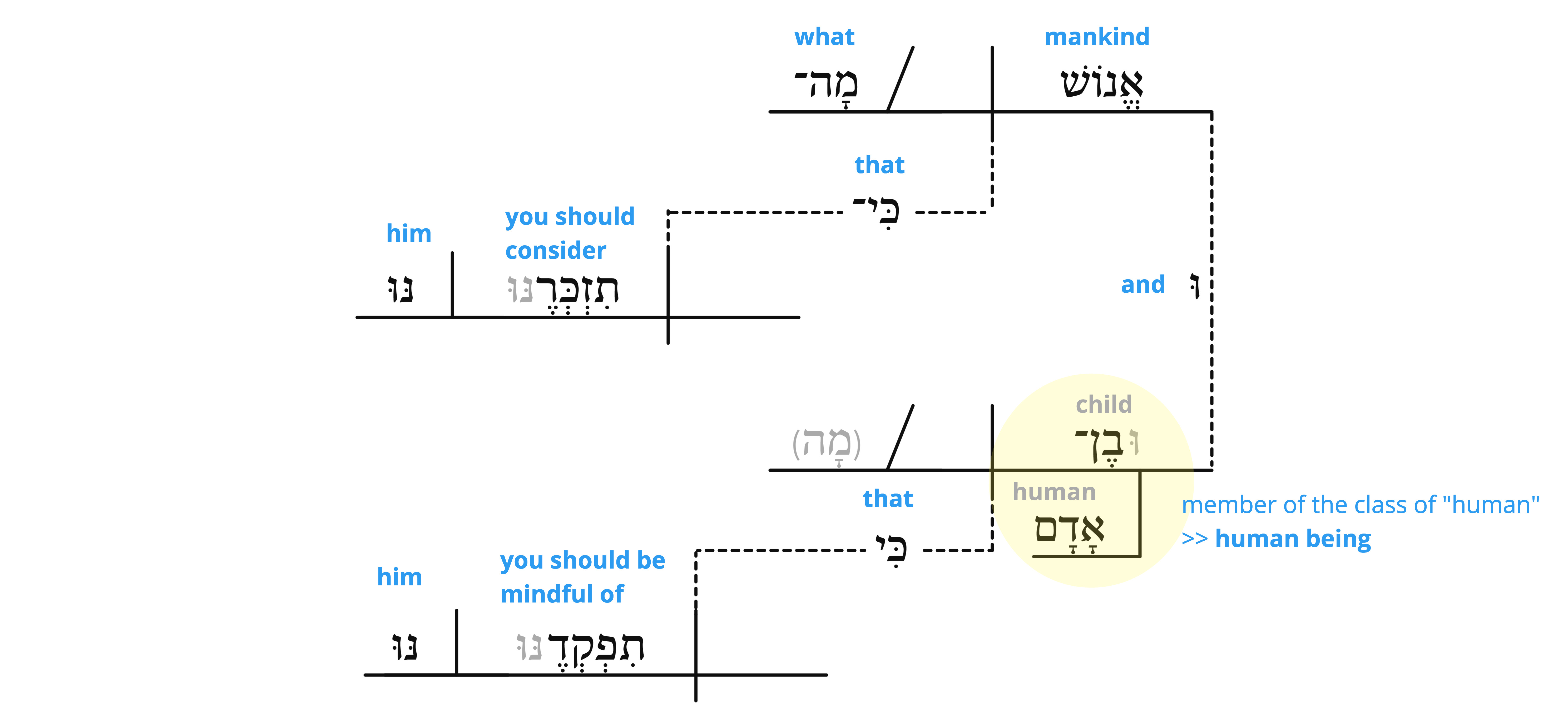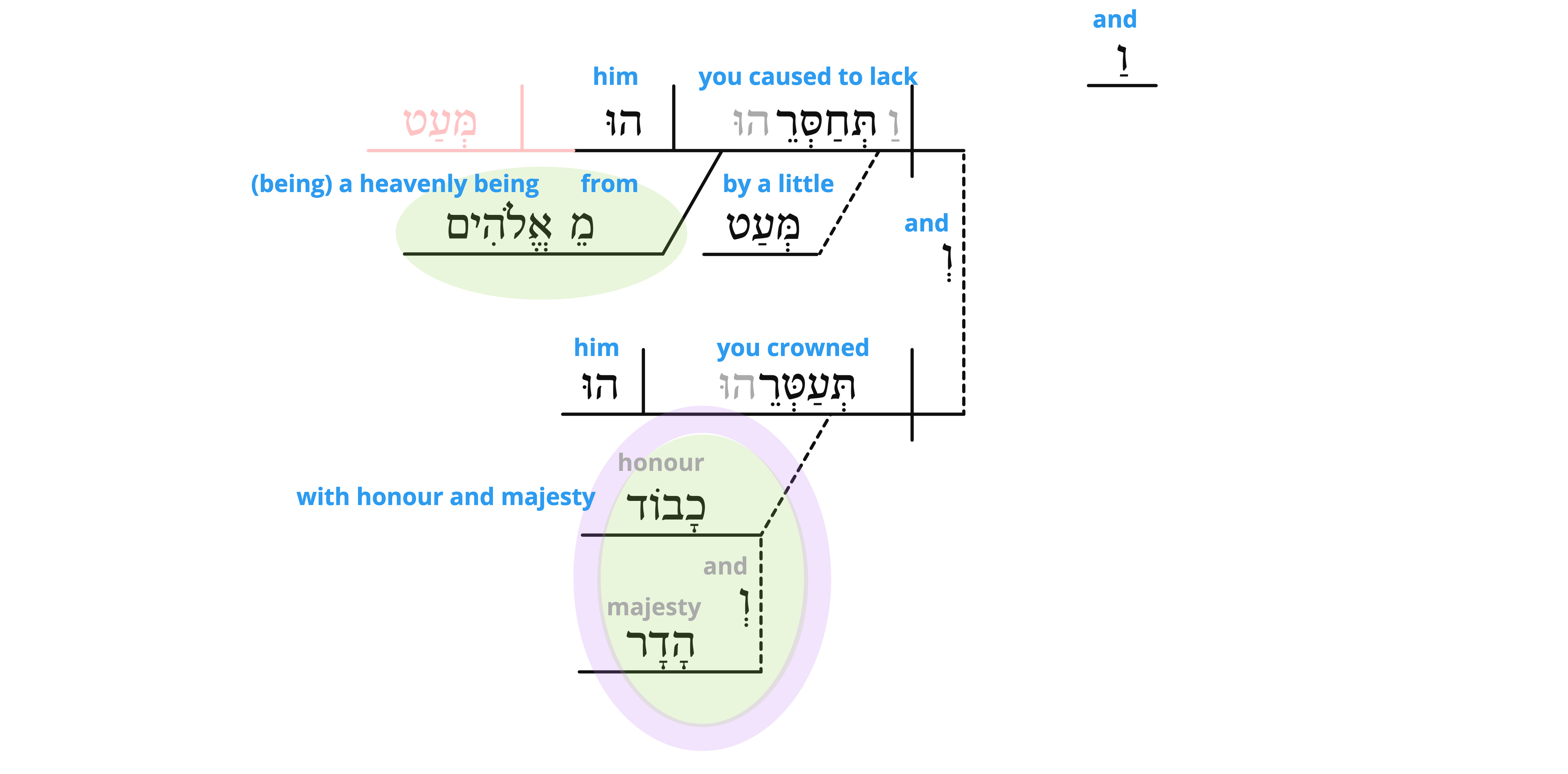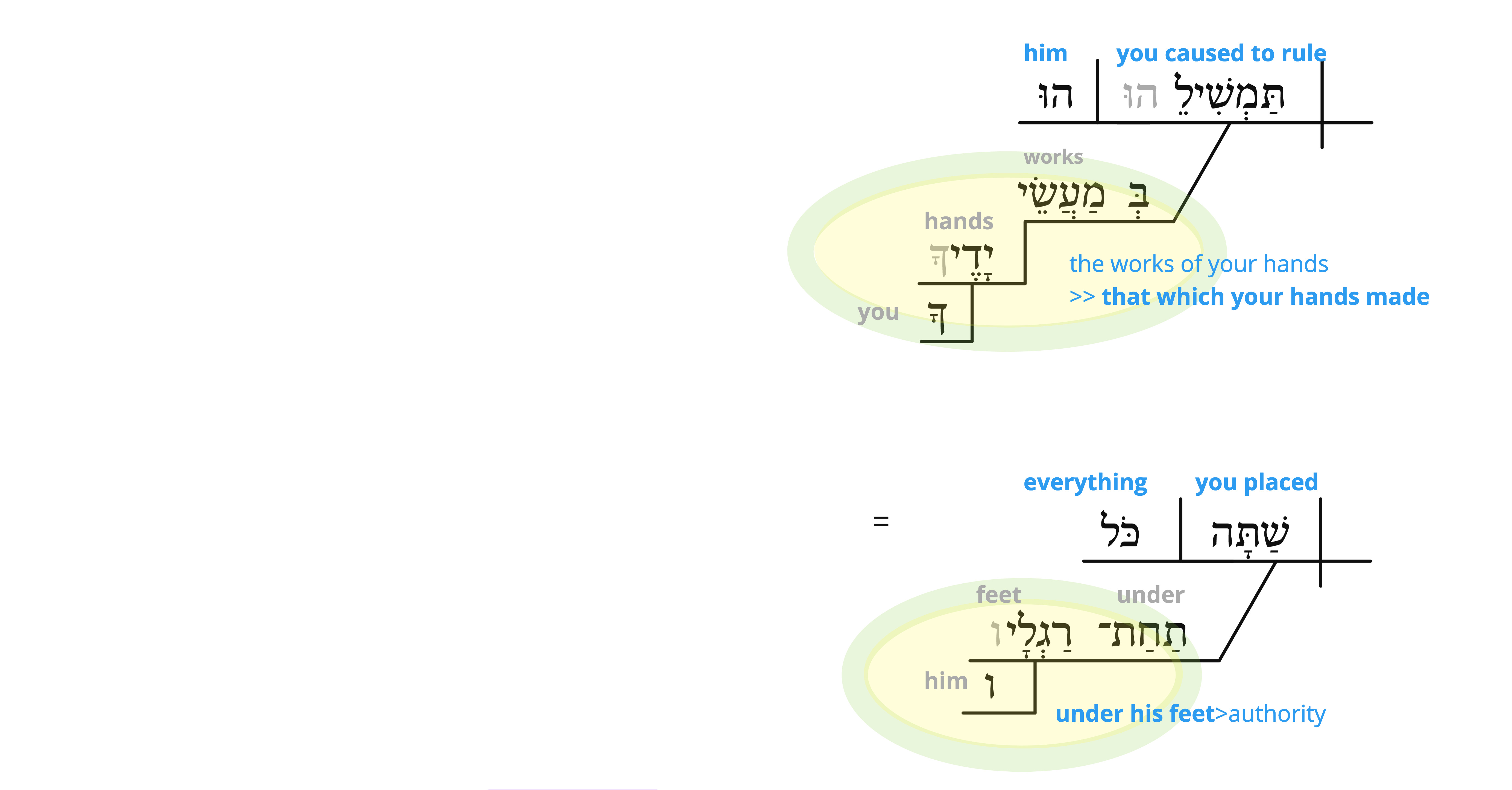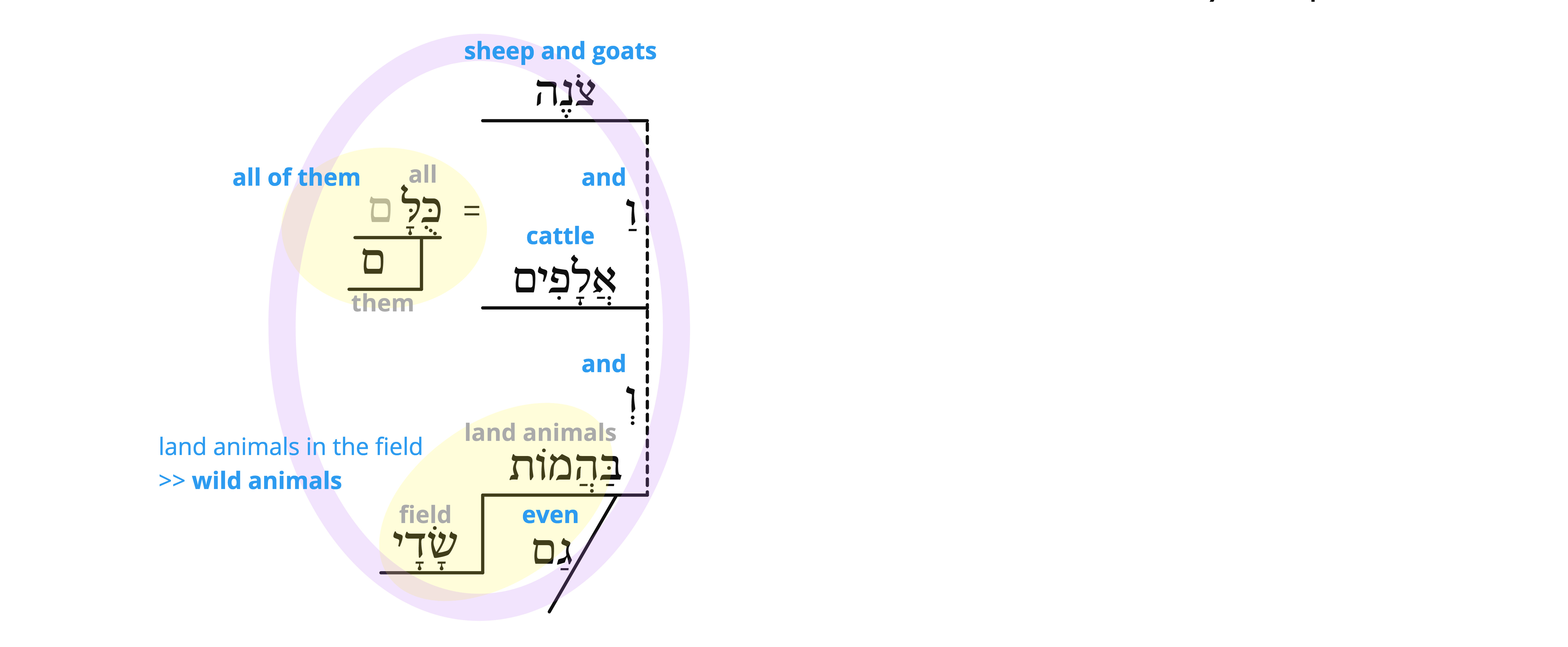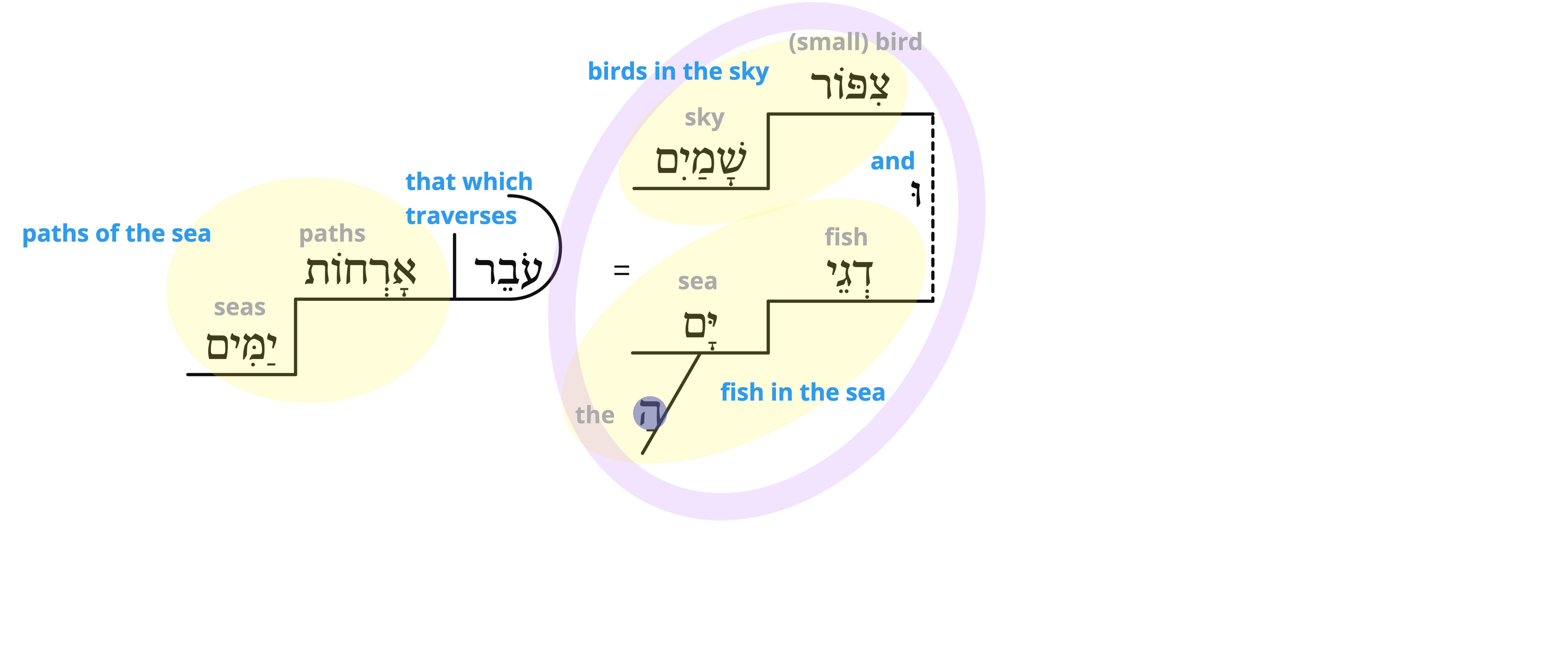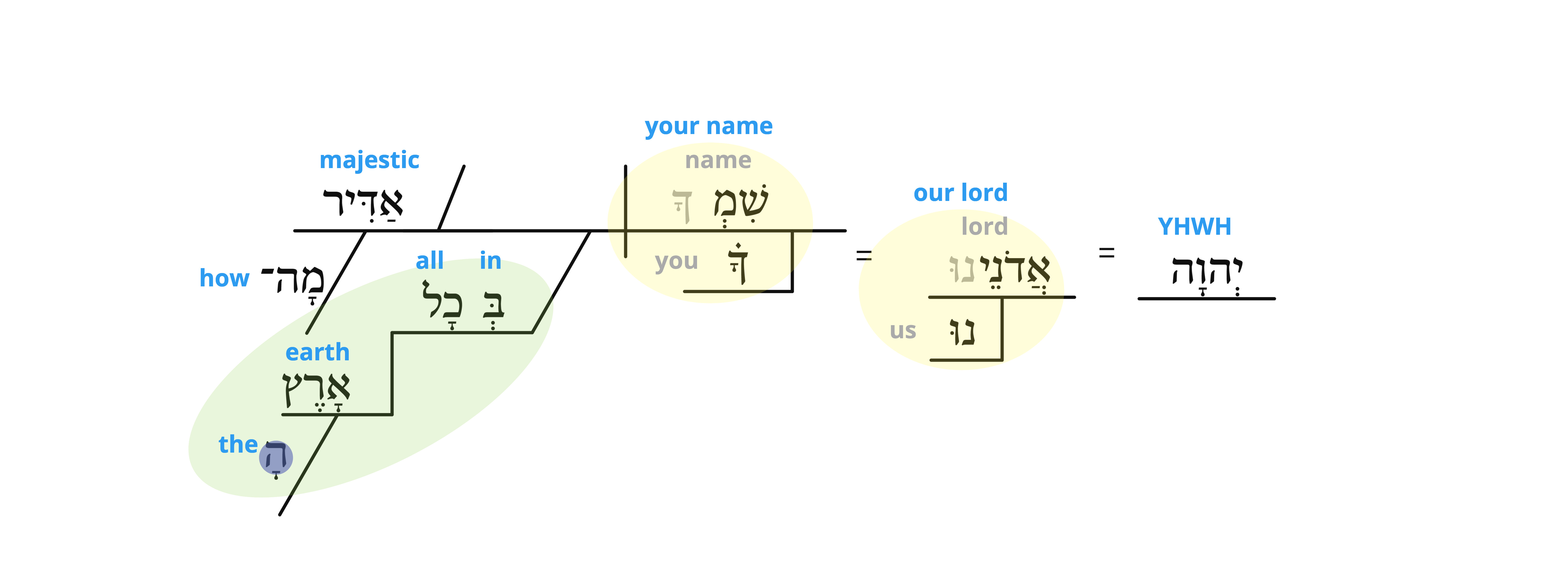Psalm 8 Semantics
From Psalms: Layer by Layer
Back to Psalm 8
| Visualization | Description |
|---|---|
| The prepositional phrase is indicated by a solid green oval. | |
| The construct chain is indicated by a solid yellow oval. | |
| When the conjunction ו appears at the phrase-level (not clause-level), it is indicated by a solid light purple oval. | |
| The article is indicated by a solid blue oval. |
v. 1
v. 2
- On the heavens. There are two ways to understand the meaning of this prepositional phrase (עַל־הַשָּׁמָיִם).
- Option 1 (preferred): "majesty on the heavens"; "you have covered the heavens with your majesty" (CSB; cf. ELB); "you reveal your majesty in the heavens above" (NET; cf. NIV, CEV; LUT; HFA, NGU). Other passages talk about someone placing (נתן) majesty on (על) someone (e.g., Num. 27:20 [Moses to Joshua]; Dan. 11:21 [someone to new king]; 1 Chron. 29:25 [YHWH to Solomon]; cf. Ps. 21:6 [YHWH to king]). In each of these passages the phrase means "to confer or transmit authority," usually of a king/leader to another king/leader. It is used here to speak of "heaven as the bearer and manifestation of the divine majesty."[1] and perhaps of the dominion which YHWH has given to the heavenly bodies (cf. Gen. 1:16-18) or to divine beings.[2] Given the clear and consistent meaning elsewhere of נָתַן הוֹד עַל as well as the fact the heavens become the object of marvel in v. 4f (which assumes that they are majestic), this option is to be preferred. YHWH bestows הוד on the heavens (v. 2) just as he bestows הוד on humans (v. 6).
- Option 2: "majesty above the heavens"; "higher than the heavens" (NLT); "above the heavens" (ESV); Cf. GNB, DHH. Ps. 148:13 says that YHWH's majesty (הוד) is על earth and heaven. In light of the previous line (נשגב), it may be best to read על in the sense of "above." Cf. נתן + על in Deut. 26:19; 28:1). The similarity between the two passages may support the same interpretation for Ps. 8:2.
v. 3
- Out of the mouths of nursing children. "Through the praise of children" (NIV; CEV: "with"). Here מן indicates 'means' and in this sense is synonymous with ב (see 2 Chron. 36:21-22 = Ezra 1:1). The two nouns ("children" and "babies") may be a hendiadys: "nursing children."[3] Cf. NEB: "of babes, of infants at the breast." In ancient Israel, "nursing children" may have included children up to three years of age.[4] Alternatively, עוֹלְלִים וְיֹנְקִים may be a merism for children young and old (cf. 1 Sam. 15:3; 22:19; Jer. 44:7).
- You have founded a fortress. Does יִסַּדְתָּ עֹז mean to "establish a stronghold" (NIV) or to "establish strength" (ESV)? The prototypical meaning of יסד is "to lay the foundations" of a building or some other structure (SDBH, entry a). It may also mean, similarly, "to found -- to build; to rebuild" (SDBH, entry b). The vast majority of occurrences of the verb, in all verbal stems, may be assigned to one of these two entries. In the piel stem and pual stem, the undergoer of the action is almost always a physical structure: a house (1 Kgs. 5:31; Zech. 4:9; 1 Chron. 6:37), a temple (Hag. 2:18; Zech. 8:9; Ezra 3:6, 10), a city (Josh. 6:26 [Jericho]; 1 Kings. 16:34 [Jericho]; Isa. 14:32 [Zion]), a stone (Isa. 28:16). There is no example of an abstract noun (e.g., "strength") as the undergoer of this action. In just two instances, the verb יסד means "appoint" or "ordain" with reference to installing into office or royal decrees (Esther 1:8 [palace staff] w/על prep.; 1 Chron. 9:22 [gatekeepers]). The first example has the preposition על. The second example clearly refers to the establishment of people, though it still occurs within the domain of construction. Both examples are post-exilic. Since יסד nearly always occurs in the domain of the construction of some building, and since עז can mean “a construction that is strong and able to resist attacks” (SDBH entry b; cf. BDB, HALOT, DCH), it is best to interpret the clause in Ps. 8:3 to mean “you have laid the foundations for a stronghold” or “you have built a stronghold” (so e.g. BDB, NIV, RSV, CSB, GNT?). Since strongholds are designed to “resist attacks”, this interpretation works well with the following phrase: “because of your adversaries, to stop the enemy and avenger.”
- In order to put an end to. This verb (the hiphil of שבת) is used some 40 times. When the patient is an inanimate object or an abstract noun, it usually means "cause to cease" (e.g. Ps. 46:10, Hos. 2:13; see DCH שבת hiphil 1a for more examples). The verb can also mean to "destroy" or "exterminate" (BDB, DCH 1e), especially when the patient is animate (e.g., 2 Kgs. 23:5, 11; Jer. 36:29; Amos 8:4; Ps. 119:119). This latter meaning of the verb fits the usage in Ps. 8:3, where the patient is animate ("vengeful enemy") (so BDB, DCH). According to this interpretation, translations such as "silence" (NIV, NLT, NRSV; cf. CEV) and "still" (ESV) may be too weak. A better rendering might be "stop" (GNT), or, even better: "put an end to" (NET, JPS85; cf. LXX αναλυειν ["put down" NETS]).
- Vengeful enemy. Rather than "the enemy and the avenger" (ESV), this may be "the vindictive enemy" (NET). "The two words for a type of hendiadys."[5]
v. 4
- Your heavens. "Your heavens" (שָׁמֶיךָ) >> "the heavens which you created." Rarely does שמים have a pronominal suffix (Lev. 26:19; Deut. 28:23; 33:28; Ps. 144:5).[6] In Ps. 8, the precise meaning of the relationship between שמים and YHWH is fleshed out by the following appositions. Because "your heavens" sounds unnatural in English, translations often have "the heavens" (CEV, GNT, NET, NLT).
- That which your fingers made. "The work of your fingers" (NIV, NLT) >> "which your fingers made" (NET). Cf. Isa. 2:8.
v. 5
- Human being. Lit.: "a son of man" (CSB) >> "a human being" >> "human beings" (NIV, NLT).
- That you should be mindful of him. "'There is probably no other Hebrew verb that has caused translators as much trouble as pqd' (E.A. Speiser, "Census and Ritual Expiation in Mari and Israel," BASOR 149 (1958) 21.) despite the fact that this word is attested in most, if not all, of the ancient Semitic languages and the seeming legion of studies devoted to it... With God as Agent, פקד expresses an intense personal attention, including careful inspection, which triggers appropriate action, whether positive (i.e., assistance) or negative (i.e., punishment)."[7]
v. 6
- from (being) a heavenly being. Most lexicons (SDBH, DCH, HALOT) and translations, ancient (LXX, the Three) and modern (NIV, ESV, NET, CEV, GNT, NEB; LUT, HFA, NGU, ELB, EU, GNB, ZUR) seem to treat the min as comparative.[8] However, as Delitzsch explains, "חסר מן signifies to cause one to be deficient in something, so that it is wanting to him (Eccles. 4:8). מן is neither comparative (paullo inferiorem ewm fecisti Deo) nor partitive (paullum derogasti ei divine naturae), but, seeing that אלהים is never used in an abstract manner so as to be equivalent to divine essentiality, negative (paullum derogasti ei ne esset Deus), so that אלהים is equivalent to מהיות אלהים, cf. 31 in 1 Sam. 15:23, מעם in Isa. 7:8." So also BDB 583.7b(b).
v. 7
- That which your hands made. "The works of your hands" (NIV, ESV) >> "everything your hands have made" (CEV). The patient of משל is very often indicated by a ב preposition (e.g., Gen. 37:8; 45:8; Judges 9:2; Joel 2:17; etc.)
v. 8
- Wild animals. "Land animals in the field" >> "wild animals" (GNT). "Given the juxtaposition (וגם [v. 8b]) of the taxon בהמות (label 3) in Psalm 8 to two domesticated land animal subclasses, and the fact that the habitat modifier שדי is used in labels for wild land animals but not in labels for domesticated land animals, the label בהמות שדי (label 3) must refer to wild land animals."[9] The same phrase occurs in Joel 2:22.
v. 9
v. 10
References
- ↑ Hupfeld 1855:153; cf. BDB: "נָתַן הוֹד עַל put majesty upon one... so also perhaps ψ 8:2.".
- ↑ On the connection between "heavens" and divine beings, cf. Ps. 89:6.
- ↑ So Zenger 1993:79.
- ↑ Cf. 2 Macc. 7:27: ἐλέησόν με τὴν ἐν γαστρὶ περιενέγκασάν σε μῆνας ἐννέα καὶ θηλάσασάν σε ἔτη τρία. "Have mercy on me, who carried you nine months in the womb and nursed you for three years."
- ↑ Baethgen 1904:21.
- ↑ There are other striking similarities between Ps. 8 and Ps. 144. (e.g. compare 144:3 to 8:6).
- ↑ Stephen W. Boyd, "The Binyamin (Verbal Stems)," in Where Shall Wisdom be Found? (Winona Lake: Eisenbrauns, 2017), 120-125. Cf. HALOT: "1. to make a careful inspection... e. to be troubled about, be concerned for (Isa. 23:17; Jer. 23:2; Zech. 11:16; Ps. 8:5)."
- ↑ This may be supported by the fact that comparative min is used with morphologically stative verbs like חסר (JM 141h).
- ↑ Whitekettle 2006:751.





